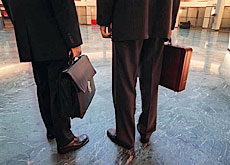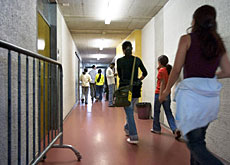Expat managers take exotic ride to the top

Switzerland can be an excellent springboard for career-minded expats – although some of them have problems getting used to the country.
For some managers dispensing with prejudices and misconceptions is the hard part, while others struggle to understand the finer points of Swiss etiquette and daily life.
Of the estimated 820,000 foreigners working in Switzerland, fewer than 50,000 are managers, according to the Federal Statistics Office.
But these business nomads are very particular. They have high expectations of their host country and many arrive with preconceived ideas about what Switzerland is like, according to François Micheloud from the relocation agency “live-in-switzerland”.
Micheloud lists seven myths about Switzerland which he says are often deeply ingrained in expats.
The first concerns what else but the weather. Although located in the middle of temperate western Europe, many think Switzerland is as cold as Siberia.
Others worry it is as expensive as Tokyo; and some believe only rock stars and steel magnates live here. More common is the perception that Swiss people are irretrievably reserved, that the landscape is overflowing with cows, banks and ski lifts, that foreigners aren’t allow to buy houses, and that it’s impossible to get a resident’s permit.
Micheloud says time is the only thing that can remove these preconceptions. “The more expats get to know Switzerland, the fewer their prejudices,” he told swissinfo.
“They discover that in summer the temperature can get as high as 38 degrees and that although it is expensive, it is not as pricey as London or Paris.”
Tips
There are other Swiss idiosyncrasies that expats find tough to cope with. “Many of our clients are amazed by Switzerland’s entrenched federalism. We remind them that almost 160 years ago Napoleon tried to pitch French centralism to the Swiss. He failed.”
Expats in Switzerland have a finely interwoven network. On the Zurich job scene alone there are 50 clubs and federations for expats that give each other tips and advice on coping with Swiss culture.
They learn that it’s simply not cricket in Switzerland to wash your car or mow the lawn on a Sunday. They also find out how to minimise the labyrinthine bureaucracy and maximise any possible tax deductions.
There are also basic language guides to help expats understand and be understood.

More
People’s initiative
Strategy
Switzerland is well advanced when it comes to globalisation and the free movement of people, at least for Europeans. In June 2002 a treaty between Switzerland the European Union agreed to phase in the free movement of labour.
Citizens of the “old” EU states can now work here free of restrictions, and more than 60 per cent of foreign workers come from northern, western and southern Europe. At present, fewer than two per cent of workers come from the new EU states, but this may increase once the relevant treaty comes into force in years to come.
Excluded are nationals of non-EU countries, unless they have qualifications which are in short supply in Switzerland.
For ambitious, career-minded managers, being an expat is almost unavoidable. “The route to the top is still paved with international assignments,” writes the headhunter firm Guido Schilling.
But remain an expat for too long, and you can lose your professional base and connections back home.
Still, while you’re climbing that peak, or pondering how long to stay, take comfort in the knowledge that, however exotic Switzerland is, you can live very well indeed.
swissinfo, Erwin Dettling in Zurich

More
EU bilateral accords
Switzerland has one of the highest foreign populations in Europe: 20.6% in 2004, according to the Federal Statistics Office.
People’s initiatives have repeatedly sought to lower the percentage of foreigners in Switzerland. These have always been rejected, most recently in 2000.
But Switzerland is not just a land of immigration. In 2005, 634,216 Swiss were living abroad.
Population: 7.5 million
Number of Swiss in employment in 2005: 3.97 million
Number of foreigners in employment: 829,000
Largest group: Italians numbering 167,000
Unemployment among Swiss: 3.2%
Unemployment among foreigners: 8.9%
EU unemployment in 2005: 8.4%
Italians made up 20% of foreign workers in Switzerland, people from the Balkans 19.5%, Portuguese 11.6% and Germans 11.3%.
The number of Swiss working abroad numbered 634,216 in 2005.

In compliance with the JTI standards
More: SWI swissinfo.ch certified by the Journalism Trust Initiative













You can find an overview of ongoing debates with our journalists here . Please join us!
If you want to start a conversation about a topic raised in this article or want to report factual errors, email us at english@swissinfo.ch.